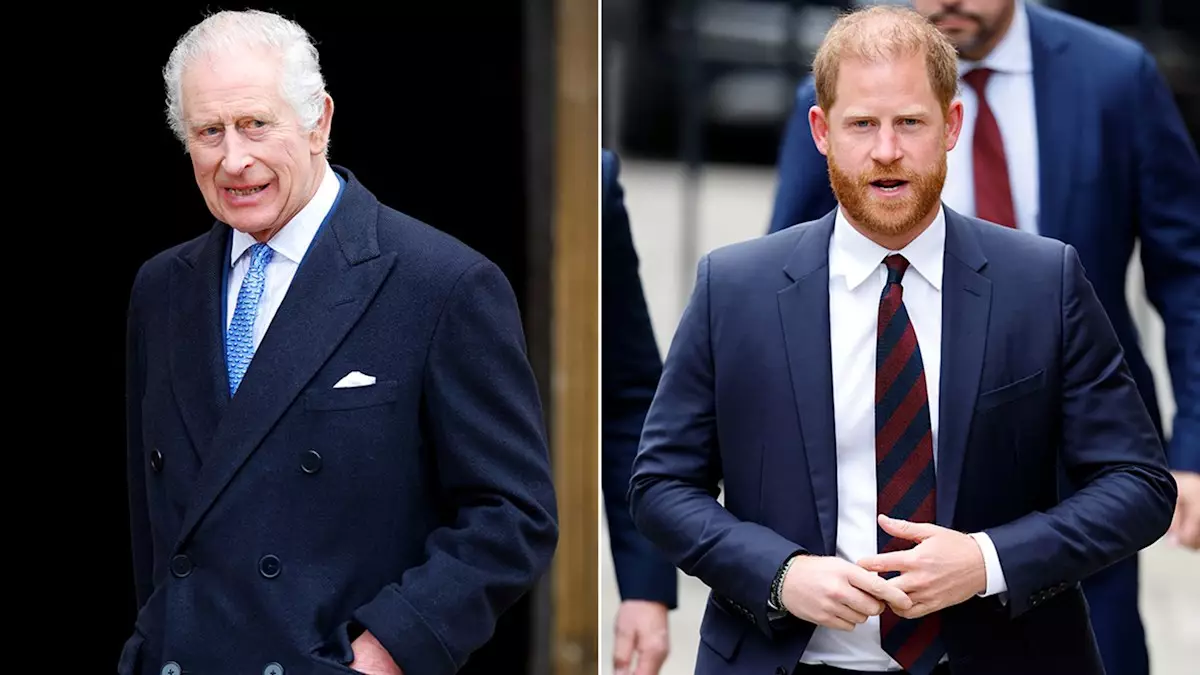The British royal family is no stranger to controversy, but recent developments illustrate an unsettling rift that continues to challenge its unity. Prince Harry’s recent interviews have shed light on his ongoing struggles with familial relationships, particularly surrounding security arrangements and the apparent emotional distance from his father, King Charles III. This fracture is not merely a personal issue; it reverberates through the public consciousness, affecting the royal family’s reputation and stability. The resignation of Harry to his family’s preferences regarding reconciliation speaks volumes of the current state of affairs—one marked by hesitation and miscommunication.
Taking a closer look at Harry’s commentary, his insistence on wanting to reunite with his family reveals both vulnerability and a profound yearning for connection. He articulated a poignant sentiment in his BBC interview when he mentioned, “Life is precious, I don’t know how much longer my father has.” Such reflections lead us to question the implications of pride and protocol that might further alienate family members during a time when unity should arguably take precedence. In an age where familial bonds can seem ephemeral, the royal family’s insularity may be of concern rather than comfort.
The Stranglehold of Tradition on Modern Relations
Meanwhile, Buckingham Palace’s staunch position, emphasizing constitutional propriety and the independence of the judiciary, paints a picture of a monarchy committed more to its historical obligations than to familial affection. The Palace stated that all security matters had been thoroughly evaluated by the courts—leading to consistent conclusions. This rigid adherence to tradition, while perhaps necessary to uphold the integrity of the institution, may inadvertently escalate an already delicate familial issue. With protocol reigning paramount, where does that leave the emotional needs of the individual members?
The potential visit of King Charles and Queen Camilla to Canada serves as a reminder of their royal responsibilities. While engaging in diplomatic relations is undoubtedly important, the juxtaposition of the royal couple abroad while Harry grapples with familial discord in the public eye raises questions about priorities. Should there not be an equally strong focus on healing internal wounds, particularly when such wounds could undermine the family’s public image?
A Diplomatic Tour Amidst Familial Turmoil
The upcoming state opening of the Parliament of Canada on May 26 and 27 underscores the duality of the royal duty. Their visit, a reflection of the monarchy’s continued commitment to the Commonwealth, comes after previous plans fell through due to King Charles’s health issues. As the couple embarks on this official visit, one cannot help but ponder whether these appearances serve to distract from deeper issues at play within the family.
Additionally, the shadow of the recent passing of Pope Francis, following his meeting with Charles and Camilla during their Italy trip, adds another layer to this multifaceted narrative. The echoes of loss and legacy linger, making the royal family’s private struggles more pronounced amidst public engagements. Engaging with global leaders enhances the monarchy’s stature, yet it also risks portraying a façade of stability that may clash with the actual dynamics at home.
A Call for Human Connection
In a world that increasingly values transparency and emotional expression, the royal family’s approach appears antiquated. Prince Harry’s candidness provides a sharp contrast to the institutional silence often associated with monarchy. His acknowledgment of personal grievances and the longing for reconciliation reflects a growing desire for authenticity, not only among the royals but within society as a whole. The public gravitation towards such honesty reveals a collective yearning for connection that transcends titles and traditions.
The reality that Harry has had to voice such grievances in public forums is a troubling commentary on the complexity of modern royal life. In contrast to historical precedent, the active dialogue between family members—especially under scrutiny—should be encouraged as a sign of strength rather than weakness. Healing these family wounds is essential, not only for internal harmony but also for the public’s perception of a royal family that has often struggled to adapt to contemporary expectations.
The world watches as the royal family navigates these turbulent waters; will they prioritize duty over heart, or find a blend that reflects the essence of what it means to be human amidst royal obligations? A renewed commitment to genuine connection may ultimately be the key to maintaining the monarchy’s relevance in today’s world.

Leave a Reply